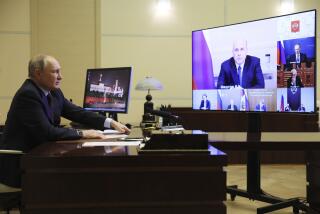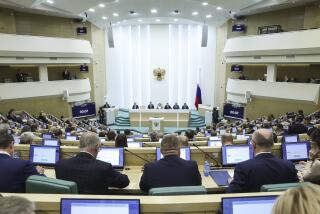Gorbachev Extends Nuclear Test Moratorium Till Jan. 1 : Challenges Reagan to Sign Pact
- Share via
MOSCOW — Kremlin leader Mikhail S. Gorbachev, citing what he termed the simple logic that without tests nuclear weapons cannot be upgraded, announced today that the Soviet Union will extend its year-old unilateral nuclear test moratorium until Jan. 1, 1987.
Speaking on Soviet national television and radio, Gorbachev challenged President Reagan to sign a treaty banning nuclear tests at a U.S.-Soviet summit later this year.
“That event would undoubtedly be the main real outcome of the meeting, a considerable step on the way toward ending the arms race,” the Communist Party general secretary said.
In Washington, State Department deputy spokesman Charles Redman reiterated the Reagan Administration’s rejection of a nuclear moratorium. “As far as the U.S. is concerned, we believe a nuclear testing moratorium is not in our security interests nor that of our friends and allies,” Redman said.
Moratorium Began in ’85
The Soviets began their moratorium Aug. 6, 1985, and extended it twice. It was to have expired this Aug. 6, the 41st anniversary of the atomic bombing of Hiroshima, Japan, by the United States.
“We are convinced even now that the ending of nuclear testing not only by the Soviet Union but also by the United States would be a real breakthrough to arresting the nuclear arms race, would speed up the elimination of nuclear arms. The logic in this is simple: if there are no tests, the nuclear weapons, which both sides have stockpiled in abundance, will not be upgraded,” Gorbachev said.
He said the ruling Politburo decided to prolong the ban for the rest of the year despite what he termed “the tone of alarm” in letters from Soviet citizens worried that the moratorium might be a danger to national security.
Political and Military
He said the signing of a bilateral test ban “would be some kind of a prologue to further progress at the (Geneva) talks on nuclear weapons and on their elimination. . . . “
Gorbachev called the decision “as much political as military,” adding:
“In taking this step, we believe that people in all countries of the world, political circles and the international public will correctly evaluate the long silence on the Soviet nuclear test ranges.”
The Soviet leader said he was appealing to “the reason and self-respect of Americans not to miss once again this historic chance on the road to stopping the arms race.”
The United States has declined to join the nuclear weapons test moratorium, citing difficulties in verifying compliance. U.S. officials also have said they want to continue some tests necessary in developing Reagan’s space-based missile defense system, known as “Star Wars.”
No Date for Meeting
Gorbachev and Reagan agreed during their first summit in Geneva in November that they would meet again this year in the United States. But the Soviets have delayed setting a date for the second meeting, saying they want assurances that it will lead to concrete steps toward disarmament.
Gorbachev’s speech came about a month before Secretary of State George P. Shultz and Soviet Foreign Minister Eduard A. Shevardnadze were to meet in Washington to discuss a summit agenda.
The English-language version of Gorbachev’s speech provided by the Soviet press agency Tass said that the “Soviet Union is confident that agreements on ending nuclear testing can be reached speedily and signed already this year at the Soviet-American summit meeting.”
But the Soviet leader did not explicitly and unconditionally commit himself to meeting Reagan before year’s end.
More to Read
Sign up for Essential California
The most important California stories and recommendations in your inbox every morning.
You may occasionally receive promotional content from the Los Angeles Times.










